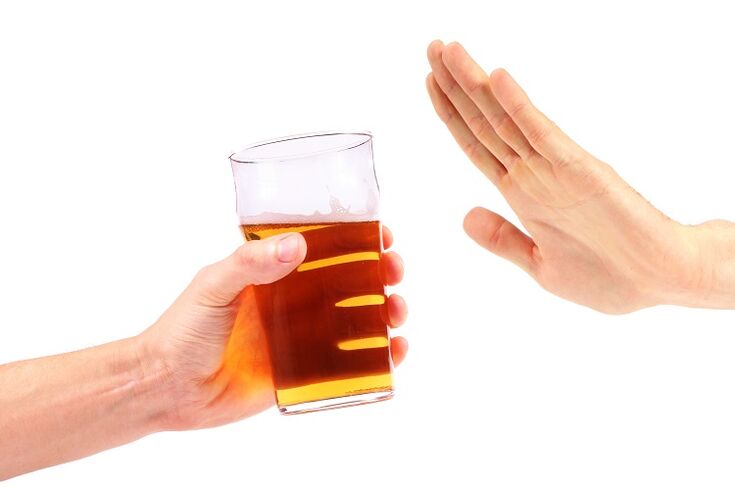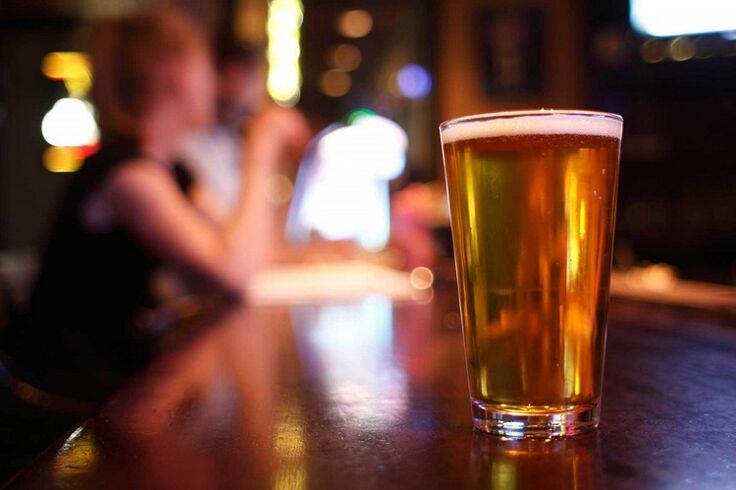At the end of a hard day’s work, you want to relax with a glass of wine or a can of beer. It seems what will happen if you drink alcohol "for pleasure" every day?
So-called "evening alcoholism" does not cause outright disapproval of society. At first glance, nothing bad happens: a glass of vodka doesn’t have an immediate withdrawal syndrome. But frequent use of alcohol affects the human body, regardless of the "elite" of the drinks. Young, successful people, 25-40 years old, who buy expensive cognac, don’t even notice the last link in the alcohol chain that stands in line with them - an unshaven, skinny man in a crumpled dress. If you suggest that this is your possible future, you will definitely be offended. However, if a person drinks alcohol every day, he or she will soon have to pay not only with money, but also with health, family ties, and social status.
Insomnia of ethyl alcohol
The amount of alcohol consumed in pure alcohol should not exceed 5 ml / day (women) and 10 ml / day (men). It is best to divide it into several tricks. That is, 25 ml of strong drink, 100 ml of wine, 250 ml of 3-4% beer, which is drunk at the festive table, do not cause devastating damage to the body of women (in men the amount doubles). However, even the frequency with which such "harmless" doses are used makes them dangerous.
The destruction of the body begins gradually. It directly depends on age, health status, body weight, hereditary predisposition. With these unfavorable coincidences, the first stage of alcoholism may occur in six months or a year. And whoever abuses alcohol lives the rest of his life in alcoholic drugs.

Psychic changes
Since the goal of daily alcohol consumption is to achieve a psychotropic effect quickly ("relaxation"), psychological dependence occurs first. After a week, one gets used to relieving stress in this way, without a break in sobriety, and after a year, forgets that it could be otherwise.
The main symptoms of events in the body are:
- Insomnia. Despite the strong hypnotic effect of ethanol, the phases of healthy sleep are disrupted under its influence. Sleep or drugs — going deep, or vice versa — will be short, restless. After that, one only needs to sleep to drink alcohol.
- Nervousness and irritability. The constant presence of alcohol in the blood causes the brain to starve oxygen. Along with sleep disorders, this leads to fatigue, which causes earlier drinking. This is how a "vicious circle" develops.
- Lowering the critical threshold. A person begins to react sharply to comments ("Yes, I keep drinking, but what's so awful about that? "), Constantly finding new reasons to drink.
- Find a reason. Gradually, the festive feasts and small portions are replaced with hearty drinks on the TV every night. The patient is willing to blame the whole world for having a formal reason to take another dose.
- Increasing aggression. The majority of domestic crimes occur in the first and second stages of alcoholism. Imaginary courage makes you seek adventure, the case often ends in a fight.
Physiological changes
The consequences of long-term alcohol consumption are irreversible disorders in the body.
- Change in blood composition. Literally a few hours later, glucose levels drop, thrombus formation increases and blood circulation deteriorates.
- Avitaminosis. Against the background of general intoxication, vitamin deficiency seems to be a small problem. However, it gradually leads to hair loss, tooth tissue destruction, indigestion and decreased immunity. Perhaps the development of anemia, early dementia, acute clinical depression.
- The effect of aging. The classic signs of an alcoholic are swelling of the face, "stars" of blood vessels on the face, pale or purple-cyanotic skin. The person appears to be 10-15 years older than the passport age. The appearance of women is changing particularly rapidly.
- Destruction of nerve cells and tissues of internal organs. It is absorbed through the esophagus with ethanol in the bloodit spreads to all the cells of the body, gradually affecting the liver, kidneys, stomach, brain.
Big belly and thin legs - all the "pleasure" of beer alcoholism
Beer is one of the most insidious drinks. Stores offer a wide variety of varieties, with advertisements urging them to "cool down". The initially low psychological vigilance triggered by strong alcohol leads to an increase in alcoholism in domestic beer.
Unlike vodka, beer is lower in calories, easier to tolerate, and has a mild hangover syndrome. However, if you drink it daily, the effect will be the same.
The elements in beer affect the production of hormones. In men with beer addiction, the breasts grow, the fat on the stomach and side is deposited, the timber of the voice becomes higher, and impotence develops. When a woman drinks a lot of beer, she acquires masculine traits: her voice hardens, antennas begin to grow above the upper lip, the figure becomes stocky, masculine.
Beer alcoholism gradually destroys the hormonal system. Infertility, thyroid tumors, diseased pancreas - this is just a small list of problems with the abuse of frothy drinks.
But beer has the most detrimental effect on the heart. In people who regularly drink 3-5 liters of beer a day, myocardial volume increases several times. There is a so-called "bovine heart" effect, which doctors call cardiomegaly. Muscle tissue gradually degenerates, shortness of breath appears, heart rhythm disturbed. In the future, the "bull's heart" threatens serious complications.

It is important to note that a small dose of ethanol in beer leads to alcohol dependence. It's just a lot harder to keep track of.
Is there truth in wine?
Speaking of the relative usefulness of wine, doctors understand beverages that are products of the fermentation of grapes, the strength of which does not exceed 13%. A glass of dry wine a week will not cause tangible damage.
However, excessive passion has the same sad consequences for them as alcohol consumption. Wine destroys the limbic system of the brain, which is responsible for memories and emotions. Abuse of wine leads to memory loss, dementia, premature dementia, and confusion.
Red wine is contraindicated in migraine, hypertension, diabetes, gastritis. White wine has a negative effect on the pancreas and brain nerve cells.
Dessert wines are high in calories, and the combination of sugar and preservatives exacerbates the negative properties of ethanol.
Sparkling wines accelerate the absorption of alcohol into the blood due to their saturation with carbon dioxide. How much can one drink at the festive table so as not to get drunk on the champagne? Literally a glass. Furthermore, the individual reaction is unpredictable.
Alcohol and chemistry
Can I drink low-alcohol drinks while taking medications? The medical answer will be categorical: no!
Even "harmless" antipyretics, such as aspirin and paracetamol, together with exposure to ethanol, can cause sudden stomach bleeding or anaphylactic shock.
It is advisable to give up even a small amount of alcohol in the evening during treatment. Ethanol increases the resistance of pathogenic bacteria to antibiotics, enhancing the side effects of many drugs. Moreover, the disease itself is a contraindication.
You should not know experimentally what will happen if you drink alcohol in addition to medication. Complications are high, even fatal.
A note for the environment
You may want to worry if:
- loved to drink more alcohol every day (including low-alcohol drinks);
- irritable, nervous;
- have symptoms of poisoning (hangover syndrome);
- complains of depression, insomnia, nightmares;
- no vacation in the house without alcohol.
When the first symptoms appear, it is important to convey to the person the need for treatment. However, you should not talk to an alcoholic if you are under the influence of intoxicating drinks or suffer from a hangover. Choose a comfortable moment, don’t stick to it, talk calmly, softly. Seek professional help if necessary.
Remember: if one spouse drinks alcohol, there is a risk that the other spouse will become addicted.
























